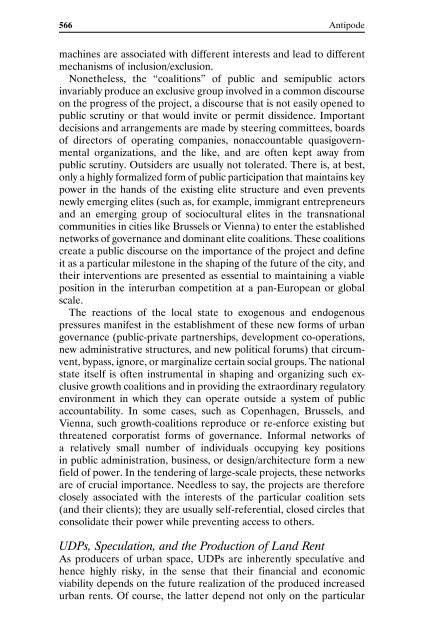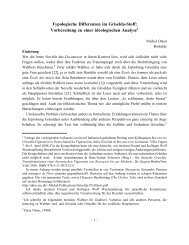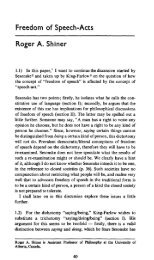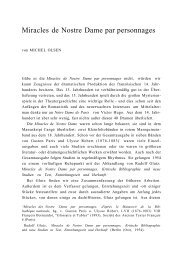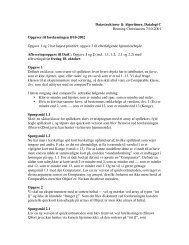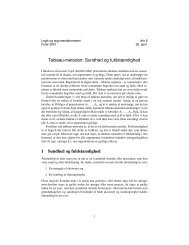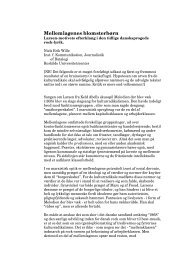Large–Scale Urban Development Projects and the New Urban Policy
Large–Scale Urban Development Projects and the New Urban Policy
Large–Scale Urban Development Projects and the New Urban Policy
You also want an ePaper? Increase the reach of your titles
YUMPU automatically turns print PDFs into web optimized ePapers that Google loves.
566 Antipode<br />
machines are associated with different interests <strong>and</strong> lead to different<br />
mechanisms of inclusion/exclusion.<br />
None<strong>the</strong>less, <strong>the</strong> “coalitions” of public <strong>and</strong> semipublic actors<br />
invariably produce an exclusive group involved in a common discourse<br />
on <strong>the</strong> progress of <strong>the</strong> project, a discourse that is not easily opened to<br />
public scrutiny or that would invite or permit dissidence. Important<br />
decisions <strong>and</strong> arrangements are made by steering committees, boards<br />
of directors of operating companies, nonaccountable quasigovernmental<br />
organizations, <strong>and</strong> <strong>the</strong> like, <strong>and</strong> are often kept away from<br />
public scrutiny. Outsiders are usually not tolerated. There is, at best,<br />
only a highly formalized form of public participation that maintains key<br />
power in <strong>the</strong> h<strong>and</strong>s of <strong>the</strong> existing elite structure <strong>and</strong> even prevents<br />
newly emerging elites (such as, for example, immigrant entrepreneurs<br />
<strong>and</strong> an emerging group of sociocultural elites in <strong>the</strong> transnational<br />
communities in cities like Brussels or Vienna) to enter <strong>the</strong> established<br />
networks of governance <strong>and</strong> dominant elite coalitions. These coalitions<br />
create a public discourse on <strong>the</strong> importance of <strong>the</strong> project <strong>and</strong> define<br />
it as a particular milestone in <strong>the</strong> shaping of <strong>the</strong> future of <strong>the</strong> city, <strong>and</strong><br />
<strong>the</strong>ir interventions are presented as essential to maintaining a viable<br />
position in <strong>the</strong> interurban competition at a pan-European or global<br />
scale.<br />
The reactions of <strong>the</strong> local state to exogenous <strong>and</strong> endogenous<br />
pressures manifest in <strong>the</strong> establishment of <strong>the</strong>se new forms of urban<br />
governance (public-private partnerships, development co-operations,<br />
new administrative structures, <strong>and</strong> new political forums) that circumvent,<br />
bypass, ignore, or marginalize certain social groups. The national<br />
state itself is often instrumental in shaping <strong>and</strong> organizing such exclusive<br />
growth coalitions <strong>and</strong> in providing <strong>the</strong> extraordinary regulatory<br />
environment in which <strong>the</strong>y can operate outside a system of public<br />
accountability. In some cases, such as Copenhagen, Brussels, <strong>and</strong><br />
Vienna, such growth-coalitions reproduce or re-enforce existing but<br />
threatened corporatist forms of governance. Informal networks of<br />
a relatively small number of individuals occupying key positions<br />
in public administration, business, or design/architecture form a new<br />
field of power. In <strong>the</strong> tendering of large-scale projects, <strong>the</strong>se networks<br />
are of crucial importance. Needless to say, <strong>the</strong> projects are <strong>the</strong>refore<br />
closely associated with <strong>the</strong> interests of <strong>the</strong> particular coalition sets<br />
(<strong>and</strong> <strong>the</strong>ir clients); <strong>the</strong>y are usually self-referential, closed circles that<br />
consolidate <strong>the</strong>ir power while preventing access to o<strong>the</strong>rs.<br />
UDPs, Speculation, <strong>and</strong> <strong>the</strong> Production of L<strong>and</strong> Rent<br />
As producers of urban space, UDPs are inherently speculative <strong>and</strong><br />
hence highly risky, in <strong>the</strong> sense that <strong>the</strong>ir financial <strong>and</strong> economic<br />
viability depends on <strong>the</strong> future realization of <strong>the</strong> produced increased<br />
urban rents. Of course, <strong>the</strong> latter depend not only on <strong>the</strong> particular


